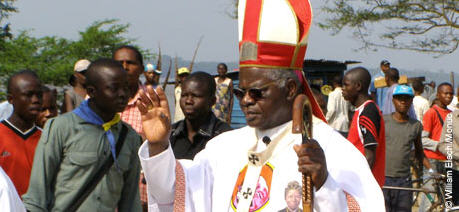
Pope Benedict XVI has convoked a special consistory for the creation of 24 new cardinals. The Holy Father made the announcement at the end of his Wednesday audience. Speaking to over 40 thousand people in an autumnal St Peter’s Square, Pope Benedict announced the names of the 24 men whom he will elevate to the College of Cardinals on November 20 next.
They come from 13 countries on five continents. Ten of them are officials in the Roman Curia, ten others are residential archbishops with the remaining four bishops over the age of 80. This means they are not eligible to vote in Conclave.
Most notably for the Anglophone world was the naming of two US men, Archbishop Donald Wuerl of Washington and Archbishop Raymond Burke, who currently heads the Supreme Tribunal of the Apostolic Segnatura. Another name of note and the only Asian on the list is Archbishop Malcom Ranjith of Colombo Sri Lanka, formerly secretary at the Congregation for Divine Worship and Discipline of the Sacraments. Finally from English speaking Africa, the Archbishop emeritus of Lusaka Zambia Medardo Joseph Mazombwe.
Pope Benedict said "The universality of the church is reflected in the list of new cardinals. In fact, they come from various parts of the world and fulfil different tasks in the service of the Holy See or in direct contact with the people of God as fathers and pastors of particular churches”.
The November consistory will leave the College of Cardinals with 203 members, of those, 121 will be eligible to vote in conclave, one more than an established limit of 120, however seven cardinals will turn 80 over the next six months. The elevation of Archbishops Wuerl and Burke will bring the number of U.S. cardinals to 18, 13 of voting-age. Europe is still the largest block with 62 cardinal electors, of whom 25 are Italian.
Pope Benedict also named three other Archbishops from Africa, Guinean Archbishop Robert Sarah, president of the Pontifical Council Cor Unum, Archbishop Laurent Monsengwo Pasinya of Kinshasa DRC and Coptic Patriarch Antonios Naguib of Alexandria, Egypt, who is currently General Rapporteur of the ongoing Synod for the Middle East.
Two men were singled out for the red hat from Latin America, Archbishop Raymundo Damasceno Assis of Aparecida in Brazil and Archbishop emeritus of Quito Ecuador Raul Eduardo Vela Chiriboga.
Three residential archbishops from Europe also made the list, they are Italian Archbishop Paolo Romeo of Palermo, Archbishop Kazimierz Nycz of Warsaw, Poland and Archbishop Reinhard Marx of Munich and Freising, Germany.
Other Curia officials who will be created cardinals in November include: Archbishop Angelo Amato, prefect of the Congregation for Saints' Causes; Archbishop Mauro Piacenza, prefect of the Congregation for Clergy; Archbishop Kurt Koch, president of the Pontifical Council for Promoting Christian Unity; Archbishop Fortunato Baldelli, Major Penitentiary, and Archbishop Velasio De Paolis, president of the Prefecture for the Economic Affairs of the Holy See.
The pope named four cardinals over the age of 80, who are "distinguished for their generosity and dedication in service of the church." They are Spanish archbishop José Manuel Estepa Llaurens Italian Archbishop Elio Sgreccia, former president of the Pontifical Academy for Life, Italian Mgr. Domenico Bartolucci, former master of the Sistine Chapel Choir and German Mgr.Walter Brandmüller, former president of the Pontifical Committee for Historical Sciences.
Pope Benedict noted that these men “have the task of helping the Successor of Peter in accomplishing his mission as the perpetual and visible source and foundation of the unity of faith and communion in the Church", and concluded, "I ask you to pray for the new cardinals, asking the intercession of the most holy mother of God so they fruitfully fulfil their ministry in the church”.
Related articles
- • Cardinal Monsengwo to Lead Annual Spiritual Exercises in the Vatican (February 11, 2012)
- • Congolese Have Lost Confidence in the Electoral Commission, Catholic Bishops Say (January 13, 2012)
- • Tshisekedi Says He Won, Can He Prove It? (December 17, 2011)
- • Presidential Election Results Not Truthful, Says Cardinal Monsengwo (December 13, 2011)
- • Opposition Mounts Against Proposed Change to Electoral Law (January 10, 2011)
- • Pope Benedict Consecrates 24 New Cardinals (November 20, 2010)
- • Congo Catholic Bishops Praise U.S. Law on 'Conflict Minerals' (August 3, 2010)
- • Pope urges end to war, education of youth in Congo (April 29, 2010)
- • Pope focuses on environment, protection of creation (January 11, 2010)
- • Archbishop Djomo elected new president of the CENCO (July 14, 2008)
- • Pope Benedict XVI calls for peace in the world in Christmas message (December 25, 2006)
- • Monsengwo: We demand that no-one returns this country to war (November 10, 2006)
- • Vote set for Sunday despite irregularities (July 27, 2006)
- • To vote, or not to vote? (June 8, 2006)
- • EU military mission gets the go ahead (March 27, 2006)
- • Annan says DR of Congo at 'critical stage' with enthusiasm for June elections (March 23, 2006)
- • President of bishops meets head of state kabila (September 21, 2005)







